Twitter: @afspnational
It has been 21 years since actress and author Mariette Hartley wrote her memoir, “Breaking the Silence.” It was a runaway national bestseller. It opened old wounds, revealed family secrets, and brought taboo subjects to the forefront with her usual candor and endless sense of humor.

Now through the benefit of self publishing, Mariette has re-issued her breakthrough celebrity tell-all. Back is the frank discussion of growing up in a family filled with alcoholism, abuse and suicide.
She also shares the backstage triumphs and pitfalls of a life lived on the Hollywood stage, and in the spotlight.
I was always a huge fan of this Emmy-winning actress, morning TV host and Polaroid pitchwoman, and wanted to know where she is now.
I was honored to talk with her recently and to find out why she decided to re-release her memoir, whether she still wants to act and if there is life – and sex – after 65.
Check out the podcast of our interview on The Women’s Eye Radio Show.
The American Foundation of Suicide Prevention Walk in Santa Monica, CA takes place on October 22, 2011…
EYE: Your book “Breaking the Silence” has been reissued. With so much in the news about suicide in the military and in the gay community, how timely is your book now?
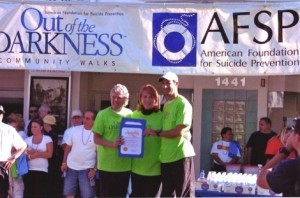
MARIETTE: It is timely. But I was in bed after I had my hip operated on, and I felt like my life was going nowhere. I didn’t want to get depressed because, of course, depression ran in my family. I talked with a life coach, and now with self-publishing — my book was a big hit in 1990 — and getting the book rights back, I said what do I do with this?
I changed it a little, and was going to bring it up to date, but then I knew that this was its own story. I am in the midst of writing another book about my mother’s passing, which was gentle and wonderful, and my new marriage, which is extraordinary. Yes, there is life and sex after 65!
“…when you get this stuff out in the universe and it’s listened to, everything begins to shift.”
EYE: Did it feel good writing your life? Did you feel liberated by revealing so much?
MARIETTE: I’ve been in therapy since I was 1! Hahaha! The book wasn’t necessarily therapeutic because I had been in many support groups and had discussed my life publicly. But to actually tell it to people who I wasn’t sure of? I speak all over the country, and have discovered that when you get this stuff out in the universe and it’s listened to, everything begins to shift.
It’s like raising consciousness, and an ability to look at my family with compassion and love and realize they had to get through what they had to get through too.
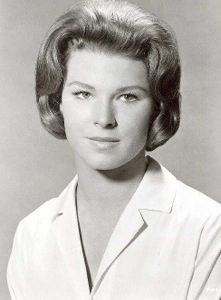 EYE: Your grandfather, John Watson, was at the forefront of the “behaviorism” movement, and wrote several books on raising children. You had a very unusual upbringing…
EYE: Your grandfather, John Watson, was at the forefront of the “behaviorism” movement, and wrote several books on raising children. You had a very unusual upbringing…
MARIETTE: His belief was that children should not be seen and heard, and furthermore, should not be held or touched. They should only be kissed lightly on the cheek before bed. On the other side of that, he also had a tremendous sexual addiction, which I learned much later.
It was such a dichotomy in my family and where do you turn with that knowledge? What is sexual and not sexual? What is simple parental intimacy and what isn’t? I had a lot of trouble with that. It took me many years to deal with that upbringing. I, of course, was the opposite. I nursed my son Sean until he got his driver’s license. Ha!!
“I didn’t like the taste of alcohol but all of my peers drank and so did my family.”
EYE: Your childhood was filled with many ups and downs. Why do you think you started drinking? You wrote that you were 26 before you knew what anger was. Why?
MARIETTE: Pretty much everyone in my town in those days drank. It was the days of the “Man In The Gray Flannel Suit” and the “Thin Man.’ They drank martinis and smoked cigars. It meant camaraderie and celebration. I didn’t like the taste of alcohol but all of my peers drank and so did my family. It was habitual. It was a way to release feelings and behaviors of self-consciousness and shame.
Appropriate responses and reactions were not a part of the family dynamic. We rarely discussed what was going on. I had no idea how to label my feelings and no one else in my family did either. There was acting out, but rarely any balanced discussion.
I also want to say that my childhood was filled with creativity and magic. I met extraordinary people who led me with love toward the career that I ultimately ended up in, acting.
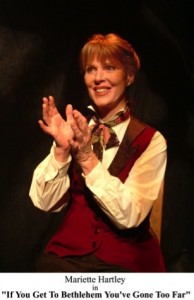
EYE: Your father’s life was very tragic. You write about him losing his job, his alcoholism, and then how depression led to his suicide in front of you and your mother.
MARIETTE: I felt it was very important to write, because a lot of people out there are struggling with stuff, and a lot of people don’t want to talk about it.
I guess the reason why I wrote it and did my one-woman show “If You Get to Bethlehem, You’ve Gone Too Far” where I played 11 characters. I just felt people need to know you can live through this and can learn profound things.
My dad was very charismatic, much like my grandfather. He had a great sense of humor. But he was manic-depressive, just like Ernest Hemingway, who was his hero. And he knew he was suffering. Since then, through my grief, and trying to work my way through and giving it meaning, I began studying mental health and realized on some level what had been going on with my dad.
“There was no awareness that there is a different kind of grief with suicide.”
Now that I work with so many people, I find that many manic-depressives turn to alcohol to find some kind of balance, but it never works. With my dad, I think the deepest sadness for me is that he was my champion. And then when he did what he did (suicide) and why I work with survivors all the time — I have to – I had no help in those days. It was 1962.
I think that people who help people who are new survivors the most are the people who have actually been through it and can reach back and pull people across the war zone. And it does feels like a war zone.
EYE: You work tirelessly on behalf of suicide survivor groups, speaking about mental health struggles and serving as spokesperson for the American Foundation of Suicide Prevention. What is the best piece of advice you give people when you speak?
MARIETTE: Just talk about it. The main thing is to remove the stigma of mental illness. I think there should be no shame. I’m bipolar; it’s biochemical in my family. I will write about this in my next book.
I recently met a woman who received a grant from my organization, the AFSP. She was so grateful because now she can continue her studies on the suicide gene! Thank God I’m living now because there are drugs and avenues to get help.
EYE: Your career took many turns. How did your difficult childhood help you adjust to literally growing up in Hollywood?
MARIETTE: Coming to Hollywood from Connecticut was culture shock. I felt like Alice in Wonderland. However, I was very lucky because the first person I met and worked with was Sam Peckinpah.
It was also the time of early television. There were wonderful writers and directors. I was able to go from one show to another and, more importantly, I could still do theatre, which is my first love and where my career began.
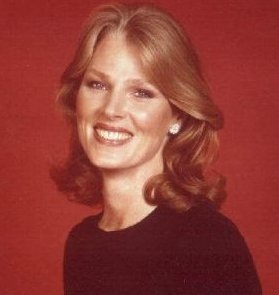
EYE: At one time, work dried up so bad that you got a job at a department store. You wrote: “Some drinkers end up in the gutter, some on skid row. I ended up at I. Magnin in Budget Dresses.” Tell me about that and how you picked yourself up and found your acting career again…
MARIETTE: I had been working as an actress and realized suddenly that I had very little money, $1,000 to be exact. I was standing on the corner of Wilshire Boulevard and Bedford. I was too shy to call people in the business, so I made a snap decision to walk across the street and ask for a job at I. Magnin.
To me that was a successful decision. Everybody has his or her own path, and that seemed to be a small part of mine. After working in budget dresses and selling pretty well, I would to do theatre at night.
People from my college, Carnegie Mellon, were there and had begun a theatre group called Theatre East which I joined. We did a new play and it went to Philadelphia on a small tour. I had to quit sales and continue on with the work that I loved.
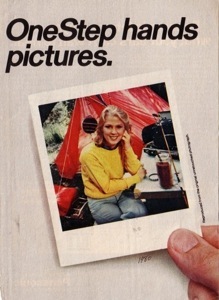 EYE: Did you have any idea the impact those Polaroid commercials would make?
EYE: Did you have any idea the impact those Polaroid commercials would make?
MARIETTE: I had absolutely no idea of the impact those commercials would have on my career and the American public. I was hired originally as a day player, which means you only work one day. They kept asking me to come back. Eventually I got the point and asked for a contract.
By the way, we did 250 commercials over a period of seven years. There were so many wonderful parts about doing these spots, not the least of which was working with James Garner. I learned so much about comedy from Bob Gage and Jack Dillon who were the amazing producers and writers of those spots. Bob would watch me like a hawk and say “Oh, no, too much!”
I trusted him with my life. I also loved the amount of days I would work. Commercials are generally done pretty quickly but with great care, and to me they are like little poems. You could spend time on a 30-second spot. Even then it only took four days. I could literally work 16 days a year and make a good living. Not bad, eh?
“The business is perfect for people who live in an illusion.”
EYE: Do you still have a passion for acting?
MARIETTE: Hollywood is an odd place. Ha! So is going to Las Vegas for a Star Trek convention. That’s another story. But I came from the theatre. There was no illusion. This business is perfect for people who live in an illusion. In theater, it couldn’t be about ego.
You don’t find that much out here. I did my one-woman show to keep myself fired up. Maybe I would do it again as long as I don’t have to move too much with my hip! I’m passionate and always have been. I will be starting a new play very soon.
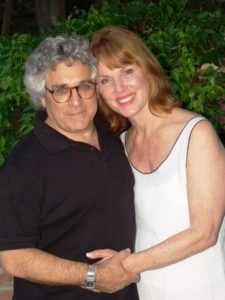
EYE: You write candidly about your past and very difficult relationships with men. What is your best piece of advice about men? And how did you come to that conclusion?
MARIETTE: Well… if you are dating, keep remembering, if you can, not to fall into the “potential trap.” Meaning, I know he will change, because I will change him. Remember that what looks like a duck and walks like a duck is usually a duck. Take time to date and get to know someone.
If it is a wonderful relationship, accept it, you are worth it. I came to this conclusion through EXPERIENCE! I have made every mistake in the book. Then when I least expected it, an extraordinary man, Jerry, walked into my life.
EYE: How would your children describe you as a mom?
MARIETTE: When I received the Best Mother of the Year Award from the “Dry Cleaners Association of America,” my son, who was four at the time, said “Why?” I think things have changed since then. My children are much older now, 36 and 33.
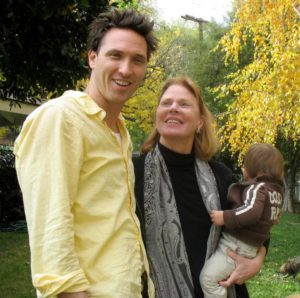
They have had extraordinary experiences (as have I), and today we have an amazing relationship with one another and with my grandson, Milo!
EYE: Mariette, it was my pleasure getting to meet you, and I can’t wait for your next book. Please come back to talk about the next chapter of your life! Oh, by the way, I owned a Polaroid camera!
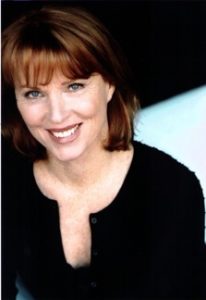


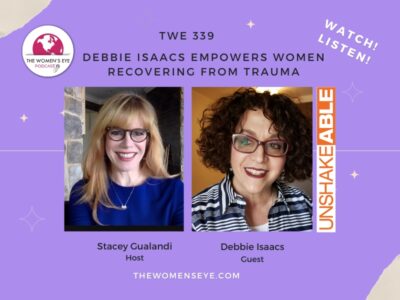
Mariette and I have a lot in common I see. I have not read her book, (Breaking The Silence), but will make time for that. I happened to reconnect with the memory of her today through an airing of a 1963 film on TCM, “Drums Of Africa”. She has been a visible figure throughout my lifetime that I always felt an explainable empathy towards since about 1969 and now it’s clear to me why. I believe that she has truly conveyed much more than professionally delivering scripted lines in the many acting parts that she’s played over the years. This is a good work that I appreciate very much; that is near and dear to my soul and will make light of to as many of those that follow my ramblings as I can. That’s a promise, sez Mr. MSD.